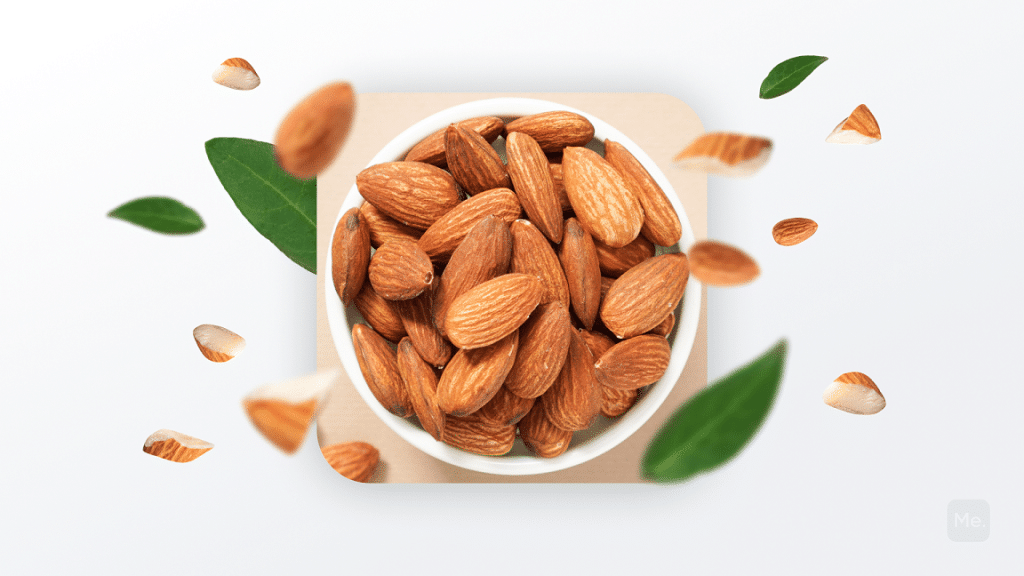The idea that certain foods can balance hormones is not new. For centuries, people have turned to food to help with everything from relieving stress and sleeplessness to strengthening their immune system. But what are the best foods for hormone balance?
Get your personalized
meal plan!
In this article, we will explore the best foods for hormone balance as well as other ways to balance your hormones such as exercise regularly and manage stress. We will also be discussing what foods you should avoid if you want to maintain good hormonal health.
How To Regulate Hormones With Food
Diet can play a crucial role in hormonal balance, first and foremost by helping you to maintain a healthy weight. Having too much or too little adipose (fat) tissue can affect your hormones. Here are 9 of the best food types you should eat for hormonal regulation:
Leafy Greens
Leafy vegetables are important low-calorie sources of essential vitamins and minerals. They are also some of the best foods for hormone regulation, for a couple of reasons.
First, they are low in calories and high in fiber. Since providing nutrition without excess calories is critical to maintaining a healthy weight, which in turn helps regulate estrogen and testosterone levels, leafy vegetables are a great staple for anyone looking to achieve hormonal balance. Second, leafy vegetables contain phytonutrients that may improve overall health and promote efficient hormone processing (10).
Thirdly, they offer an excellent source of vitamin K. Studies have shown that vitamin K deficiency may result in poor testosterone production, at least in animals. Finally, these vegetables provide ample amounts of folate. Folate plays an important role in reproductive health.
Some of the best leafy greens to include in your diet are:
- Collard greens
- Kale
- Spinach
- Romaine lettuce
- Mustard greens
- Endive and cress (AKA: garden cress)
- Lettuce of any type
- Bok choy
- Brussels sprouts
Read More: Hormones And Weight Gain: 7 Hormones That Control Your Weight And How To Balance Them
Root Vegetables
In addition to many nutrients that our bodies need for proper functioning, root vegetables also contain fiber which also helps with weight management and therefore hormone balance (22).
Some of the best root vegetables to include in your diet are:
- Carrots
- Radishes
- Parsnips
- Turnips
- Rutabagas
Cruciferous Vegetables
Cruciferous vegetables contain a type of phytonutrients called Indoles. Indoles are plant hormones that may influence human hormone signaling and therefore might reduce the risk of certain hormone-dependent cancers (16). Cruciferous vegetables also contain important phytonutrients which may help improve estrogen metabolism and potentially be helpful for those with estrogen dominance. Estrogen dominance is especially common for women going through menopause or just stopped taking birth control pills. It’s also highly associated with PCOS, a hormonal disorder that affects about 10% of women (4).
These vegetables are also high in fiber. This is great for stabilizing your blood sugar levels, which helps you avoid the ups and downs of blood glucose and insulin. Plus, again, great for digestive health and weight management.
You need a healthy liver for effective hormone regulation. That’s because your liver needs to break down excess hormones and remove them from your body. Studies show that vegetables like broccoli and Brussels sprouts may help to improve liver function and prevent many diseases related to detoxification pathways (5).
Finally, cruciferous vegetables have anti-inflammatory properties that are very important for perimenopausal women who experience inflammatory bowel conditions like irritable bowel syndrome (IBS), Crohn’s disease, or ulcerative colitis (3).
Some of the best cruciferous vegetables to include in your diet are:
- Broccoli
- Brussels sprouts
- Cauliflower
- Kohlrabi
- Collard greens
- Mustard greens
- Bok choy
Fermented Foods
Fermented foods can help to regulate hormone levels through several mechanisms. First of all, they contain an abundance of healthy bacteria that are essential for nutrient absorption and proper digestion. Secondly, fermented foods support a robust microbiome which contributes to overall health, weight management, and hormonal balance (12).
Examples of fermented foods include:
- Sauerkraut
- Kefir
- Kimchi
- Tempeh
- Yogurt
- Kombucha tea
- Pickles
- Miso soup (fermented soybean paste)
- Natto (pasteurized soybeans)
- Tamari (fermented wheat)
Healthy Fats
Dietary fat has been given a bad rap in the past due to its association with cardiovascular disease and obesity. However, we now know that not all fats are created equal. Different types of dietary fats have different effects on various body systems and functions (e.g., reproductive health). Sometimes producing very positive results when consumed strategically. In fact, recent research is demonstrating how diets rich in some forms of dietary fat can even promote fertility in certain women when eaten wisely (20).
Eating healthy fats is crucial for overall hormone balance, especially during menopause. Your body needs these nutrients to provide energy and for many other functions in the body.
Some good sources of healthy fats include:
- Avocados
- Fish
- Nuts (almonds, Brazil nuts, cashews, macadamia nuts)
- Seeds (pumpkin seeds, sunflower seeds, hemp seeds/hearts)
- Extra virgin olive oil
Fatty Fish
Eating fish twice per week may reduce the risk of cognitive decline and depression in women after menopause. They are also rich in healthy omega 3 fatty acids that help to maintain hormonal balance by reducing inflammation (9). Some types of fish that you should eat often include:
- Wild-caught salmon
- Herring
- Sardines
- Anchovies
- Mackerel
- Black cod/sablefish
Looking for a way to break the vicious cycle of weight loss and tone up all the jiggly parts? Watch the extra pounds fly off and your muscles firm up with the BetterMe app!
Whole Grains
Eating whole grains that are rich in fiber can help to keep your intestinal tract functioning properly. Whole grains also support blood sugar control, ensuring that you have adequate energy throughout each day while curbing cravings for unhealthy foods (11).
Some types of whole grain include:
- Oatmeal
- Quinoa
- Brown rice
- Millet
- Wild rice
- Buckwheat.
Organic Fruits And Vegetables
Conventionally grown fruits and vegetables are often exposed to pesticides and other chemicals which are believed to be endocrine disruptors. It isn’t clear whether this has a meaningful impact on our health or hormone levels, but if the idea concerns you, buying organic whenever possible or washing produce thoroughly before consuming are ways to limit your exposure (15).
Nuts And Seeds
Another great food group to eat during menopause is nuts and seeds. These nutrient-dense, high-fat foods are loaded with healthy fats that help to regulate blood sugar levels while providing amino acids for hormone production outside of the reproductive system (18). Some types of nuts and seeds include:
- Pecans
- Almonds
- Macadamia nuts
- Hazelnuts
- Brazil nuts
- Pistachios
- Pine nuts
- Hemp hearts/hemp seeds
Herbs And Spices
Herbs and spices can help you regain hormonal balance. For example, a compound found in turmeric has potent anti-inflammatory properties. Women with hormonal disorders may experience inflammation in their gut lining which is associated with issues like IBS and autoimmune disorders like Hashimoto’s disease. Using spices like curry powder in your cooking can be an easy way to incorporate this beneficial compound into your diet (1):
- Turmeric
- Oregano
- Ginger
- Cinnamon
- Black Pepper
- Chili Powder
Read More: Low Estrogen Diet: Balance Your Hormones Through Your Meal Plan
Foods To Avoid For Hormonal Balance
There are certain foods that you should avoid to promote hormonal balance. These include:
Refined Carbohydrates
Many processed foods are loaded with refined carbohydrates which are broken down into sugar in the body. This can lead to blood sugar spikes and weight gain that could cause hormonal imbalance (23). Instead of snacking on chips or candy bars, choose healthy options like:
- Celery
- Carrots
- Red pepper strips
Sugar
Excessive sugar intake may be associated with estrogen dominance. This could lead to a variety of different conditions like infertility, endometriosis, fibroids, and mood swings (13).
Processed Meat & Poultry Products
Processed animal products may have a lot of what we call “xenoestrogens,” or environmental estrogens that have the potential to mimic the hormone estrogen in your body (15).
On the other hand, eating processed meats is associated with increased risk of certain cancers. They are also typically high in sodium and saturated fat.
Avoid Trans Fats
Trans fats should be avoided because they may promote inflammation in your gut, increasing your risk for colon cancer. They are also known to be detrimental to heart health and are best avoided.
Alcohol
Alcohol is often associated with parties, celebrations, and social settings. Unfortunately, alcohol can disrupt the endocrine system, possibly leading to hormonal imbalance (8).
Alcohol also affects your sleep quality by disrupting REM cycles which impedes healthy hormone regulation during this critical phase of detoxification that occurs while you catch some sleep (8).
If you tend to let yourself off the hook, raise the white flag when things get tougher than you expected, send yourself on an unconscious binge-eating trip – BetterMe app is here to help you leave all of these sabotaging habits in the past!
Other Ways To Balance Hormones
While diet can play an important role in hormone regulation, it is not the only solution. Other ways you can prevent imbalances and improve your overall health include:
Exercising Regularly
A sedentary lifestyle has negative effects on your hormone balance since it causes inflammation and weight gain. Plus, physical activity helps to regulate your appetite and make you feel more energetic throughout the day. You can exercise indoors or outdoors depending on your preference.
Be Mindful Of Stress
Stress is a leading contributor to all kinds of ailments including hormonal imbalances (2). To relieve stress (and minimize cortisol release), you can try yoga, meditation, taking a walk outside or doing some deep breathing exercises. Changing your environment is also an effective way to decrease stress; for instance, if you are constantly around people who make you feel uncomfortable, take a step back and remove yourself from their presence.
Avoid Overeating Or Undereating
Eating too much can make you feel bloated and lethargic, leading to weight gain and potentially chronic health problems. Undereating is just as detrimental since your body needs the nutrients to function properly (19). Eat small meals throughout the day to keep your blood sugar balanced and give your body a steady supply of energy. The key is to find a healthy balance between eating enough calories and maintaining lean muscle mass!
Get Consistent High Quality Sleep
Quality sleep is vital in preventing hormonal imbalances and allowing your body to repair itself. It also helps you manage stress, balance your appetite, and boost energy levels throughout the day. Aim for 7-9 hours of deep restorative sleep every night.
The Bottom Line
Your diet plays a significant role in hormone regulation by providing the nutrients your body needs for proper functioning and helping you to maintain a healthy weight. To prevent imbalances, avoid ultra processed foods and sugar, drink plenty of water throughout the day, and start consuming more greens and fruits! Also, make sure to exercise 3-5 times a week for at least 30 minutes and get plenty of high-quality sleep for 7-9 hours every night.
DISCLAIMER:
This article is intended for general informational purposes only and does not address individual circumstances. It is not a substitute for professional advice or help and should not be relied on to make decisions of any kind. Any action you take upon the information presented in this article is strictly at your own risk and responsibility!
SOURCES:
- 5 Spices with Healthy Benefits (n.d., hopkinsmedicine.org)
- 5 Things You Should Know About Stress (n.d., nih.gov)
- Cruciferous Vegetable Intake Is Inversely Correlated with Circulating Levels of Proinflammatory Markers in Women (2014, nih.gov)
- Cruciferous vegetables, Cancer and Estrogen metabolism (n.d., stevegranthealth.com)
- Dietary Broccoli Lessens Development of Fatty Liver and Liver Cancer in Mice Given DiethyLnitrosamine and Fed a Western or Control Diet (2016, nih.gov)
- Dietary fat intake and reproductive hormone concentrations and ovulation in regularly menstruating women (2016, nih.gov)
- Eating Soy May Turn on Genes Linked to Cancer Growth (2014, breastcancer.org)
- Effects of Alcohol on the Endocrine System (2014, nih.gov)
- Fish Intake Is Associated with Slower Cognitive Decline in Chinese Older Adults (2014, nih.gov)
- Health Benefits and Therapeutic importance of green leafy vegetables (GLVs) (2020, researchgate.net)
- Health Benefits of Dietary Whole Grains: An Umbrella Review of Meta-analyses (2017, nih.gov)
- Health benefits of fermented foods (2019, nih.gov)
- High-Fat, High-Sugar Diet Disrupts the preovulatory Hormone Surge and Induces Cystic Ovaries in Cycling Female Rats (2017, nih.gov)
- Human health implications of exposure to xenoestrogens from food (2005, core.ac.uk)
- Human health implications of organic food and organic agriculture: a comprehensive review (2017, nih.gov)
- Indole-3-carbinol: a plant hormone combatting cancer (2018, nih.gov)
- Nutrients and bioactives in green leafy vegetables and cognitive decline (2018, nih.gov)
- Nuts and seeds (2021, vic.gov.au)
- The Effects of Under-Eating (2018, eating-disorders.org.uk)
- The Influence of Diet on Fertility and the Implications for Public Health Nutrition in the United States (2018, nih.gov)
- Trans fats-sources, health risks and alternative approach – A review (2011, nih.gov)
- What Are the Health Benefits of Root Vegetables? (2020, webmd.com)
- Your Blood Sugar May Be Driving Your Hormone Imbalance (n.d., hormonewellnessmd.com)


















